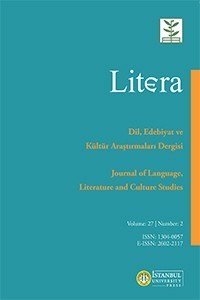Whatever Singularity in de Bernières’ Captain Corelli’s Mandolin
Whatever Singularity in de Bernières’ Captain Corelli’s Mandolin
This paper explores Louis de Bernières’ novel Captain Corelli’s Mandolin from the perspective of Giorgio Agamben’s concept of “whatever singularity”, the main theme of his The Coming Community. Agamben’s work provides a clear distinction from homogenized communities and nations to argue for the possibility of how groups and peoples living together without reducing their distinct individual and cultural identities to sameness. Besides, whatever singularities border ‘in-between’ spaces and thresholds and that is the space where friendship emerges from. In this context, the article aims to apply Agamben’s essay ‘The Friend’ to explore the concept of friendship. The novel is set mainly during the Italian and Nazi occupations of the Greek island of Cephalonia in World War II. Although occupying forces aim to constitute a fixed society, intercommunal friendship emerges between different nations. In this regard, the love between the Italian soldier Captain Corelli and the local girl Pelagia, as well as the friendship among Dr. Iannis, Captain Corelli, and Carlo Piero Guercio will be examined in terms of friendship and ‘whatever singularity’. Moreover, the friendship between ‘The Good Nazi’ Günter Weber, who is forced to shoot his Italian friends, and Captain Corelli will be investigated through the concept of friendship. In the narrative, the Communist Greek resistance group ELAS, a destructive occupying force, tries to form a fixed homogenous ideological group on the island bearing similarities with fascist and Nazi groups. Therefore, this will also be discussed in the context of the tension between heterogeneous and homogenous communities
Keywords:
whatever singularity, threshold, bordering, friendship Agamben,
___
- Agamben, G. (1993). The Coming Community. (M. Hardt, Trans.) (S. Buckley, M. Hardt, & B. Massumi, Eds.). Minneapolis, MN: University of Minnesota Press. (Original work published 1990). google scholar
- Agamben, G. (2009). The friend. What is an apparatus? And other essays (pp. 25-38), (D. Kishik & S.Pedatella, Trans.). Stanford, CA: Stanford University Press. (Original work published 2007). google scholar
- Aristotle (1885). Politics. (B. Jowett, Trans.). Oxford, UK: Oxford University Press. google scholar
- Aristotle (1998). Politics. (C.D.C. Reeve, Trans.). Indianapolis, Ind: Hackett Pub. google scholar
- Bennington, G. (2009). Political animals. Diacritics, 39(2), 21-35. Retrieved from www.jstor.org/stable/41416235 google scholar
- de Bernieres, L. (1994). Captain Corelli's Mandolin. London: Vintage. MacMillan, Catherine. (2020). “HOSTILITY, HOSPITALITY AND AUTOIMMUNITY IN DE BERNIERES’ CAPTAIN CORELLI’S MANDOLIN”. GLOBAL CONVERSATIONS: An International Journal in Contemporary Philosophy and Culture (III), 01. 9-25. google scholar
- De la Durantaye, L. (2009). Giorgio Agamben: A Critical Introduction, Standford University Press, Standford. google scholar
- Golban, Tatiana. “Reconstructing the Ancient Mythemes: Thematic Enclosure of Dr. Iannis as a Postmodern Odysseus in Captain Corelli’s Mandolin”. Ankara Üniversitesi Dil ve Tarih-Coğrafya Fakültesi Dergisi 54, 2(2014), 347. google scholar
- Sheppard, Richard. “Savagery, Salvage, Salves and Salvation: The Historico-Theological Debate of Captain Corelli’s Mandolin,” Journal of European Studies xxxii (2002), p. 51. google scholar
- Başlangıç: 1954
- Yayıncı: İstanbul Üniversitesi
Sayıdaki Diğer Makaleler
Analysis of the Mythical Discourse of “La esfinge de oro” by Carlos Raúl Sepúlveda
Peter Shaffer’s Equus and Equine-assisted Psychotherapy (EAP)
Fethiye KABATAŞ KESKİN, Ebru YENER GÖKŞENLİ
Homines Sacri of Eskibahçe: An Agambenian Reading of Louis de Bernières’ Birds without Wings
Çeviri Eğitiminde Kavram Haritalarının Kullanımı
Kurgusal Eserlerde Otizm Ve Buzdolabı Anne Teorisi: Pauline Holdstock’ın Here I Am! Adlı Romanı
